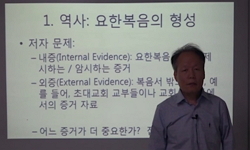이 글은 ‘고 기독론’을 비롯한 요한복음만의 독특한 사상이 사마리아의 영지주의에서 기원했을 가능성을 모색한다. 불트만이 제일 먼저 그런 모색을 하며 요한복음을 만디아파 영지주의...
http://chineseinput.net/에서 pinyin(병음)방식으로 중국어를 변환할 수 있습니다.
변환된 중국어를 복사하여 사용하시면 됩니다.
- 中文 을 입력하시려면 zhongwen을 입력하시고 space를누르시면됩니다.
- 北京 을 입력하시려면 beijing을 입력하시고 space를 누르시면 됩니다.
https://www.riss.kr/link?id=A109773988
-
저자
우진성 (한신대학교)
- 발행기관
- 학술지명
- 권호사항
-
발행연도
2025
-
작성언어
Korean
-
주제어
영지주의 ; 요한복음 ; 사마리아 ; 도시테우스 ; 나그함마디 ; Gnosticism ; The Gospel of John ; Samaria ; Dositheos ; Nag Hammadi
-
등재정보
KCI등재
-
자료형태
학술저널
-
수록면
165-197(33쪽)
- 제공처
-
0
상세조회 -
0
다운로드
부가정보
국문 초록 (Abstract)
근래의 영지주의 연구 동향은 영지주의를 종교적 종파로 보기보다는 세계관 혹은 사상으로 보는데, 사마리아에 존재한 이런 의미의 영지주의가 요한복음에 영향을 끼쳤을 가능성이 있다고 살피는 것이다. 요한복음 연구자들이 대체로 요한복음과 사마리아가 연관 있다는 점을 인정하고 특히 ‘고 기독론’이 사마리아에 연원을 두고 있을 가능성을 인정한다. 사마리아의 사회, 정치, 종교의 역사는 영지주의와 같은 급진적으로 새로운 사상이 탄생할 가능성이 높은 토양을 제공하고, 그 결과 사마리아에는 헬레니즘 문화와 그 한 갈래로서의 영지주의가 번성하였다는 것을 쉽게 추정할 수 있다. 그럼에도 불구하고, 요한복음에 대한 사마리아의 영향을 인정하는 학자들조차도, 요한복음에 끼친 ‘사마리아 영향’의 실체가 영지주의였을 가능성에 대하여 탐구하지 않는다. 이 글은 사마리아 영지주의가 요한복음에 영향을 주었을 가능성을 탐색한다.
이 글은 ‘고 기독론’을 비롯한 요한복음만의 독특한 사상이 사마리아의 영지주의에서 기원했을 가능성을 모색한다. 불트만이 제일 먼저 그런 모색을 하며 요한복음을 만디아파 영지주의와 연결한 바 있다. 비록 만디아파와의 연결은 시대착오로 밝혀졌지만, 요한복음이 영지주의적이라는 불트만의 관점은 여전히 유효하다. 여기서 말하는 영지주의는 교부들이 말하는 ‘이단 종파’로서의 영지주의가 아니다.
근래의 영지주의 연구 동향은 영지주의를 종교적 종파로 보기보다는 세계관 혹은 사상으로 보는데, 사마리아에 존재한 이런 의미의 영지주의가 요한복음에 영향을 끼쳤을 가능성이 있다고 살피는 것이다. 요한복음 연구자들이 대체로 요한복음과 사마리아가 연관 있다는 점을 인정하고 특히 ‘고 기독론’이 사마리아에 연원을 두고 있을 가능성을 인정한다. 사마리아의 사회, 정치, 종교의 역사는 영지주의와 같은 급진적으로 새로운 사상이 탄생할 가능성이 높은 토양을 제공하고, 그 결과 사마리아에는 헬레니즘 문화와 그 한 갈래로서의 영지주의가 번성하였다는 것을 쉽게 추정할 수 있다. 그럼에도 불구하고, 요한복음에 대한 사마리아의 영향을 인정하는 학자들조차도, 요한복음에 끼친 ‘사마리아 영향’의 실체가 영지주의였을 가능성에 대하여 탐구하지 않는다. 이 글은 사마리아 영지주의가 요한복음에 영향을 주었을 가능성을 탐색한다.
다국어 초록 (Multilingual Abstract)
This analysis adopts a contemporary understanding of Gnosticism as a comprehensive worldview or system of ideas, distinct from its categorization as a heretical sect by Church Fathers. Johannine scholars generally acknowledge the connection between the Gospel of John and Samaria, and in particular recognize the possibility that high-Christology may have had its origin in Samaria. Despite the fact that the social, political, and religious history of Samaria provides a fertile ground for the birth of new ideas such as Gnosticism, and that Samaria was home to a thriving Hellenistic culture and Gnosticism as a branch of that culture, even scholars who accept a Samaritan influence on the Gospel of John have not investigated the possibility that the “Samaritan influence” on the Gospel was Gnosticism. This article addresses the hitherto unexplored hypothesis that the acknowledged “Samaritan influence” on the Gospel of John may have been Gnostic in nature.
This article investigates the potential influence of Samaritan Gnosticism on the Gospel of John, particularly regarding its distinctive theological concepts, for example its high-Christology. While acknowledging R. Bultmann’s initial hypothesis link...
This article investigates the potential influence of Samaritan Gnosticism on the Gospel of John, particularly regarding its distinctive theological concepts, for example its high-Christology. While acknowledging R. Bultmann’s initial hypothesis linking the Gospel to Mandaean Gnosticism, a connection subsequently deemed anachronistic, this article revisits Bultmann’s broader assertion of a Gnostic influence on the Gosple of John.
This analysis adopts a contemporary understanding of Gnosticism as a comprehensive worldview or system of ideas, distinct from its categorization as a heretical sect by Church Fathers. Johannine scholars generally acknowledge the connection between the Gospel of John and Samaria, and in particular recognize the possibility that high-Christology may have had its origin in Samaria. Despite the fact that the social, political, and religious history of Samaria provides a fertile ground for the birth of new ideas such as Gnosticism, and that Samaria was home to a thriving Hellenistic culture and Gnosticism as a branch of that culture, even scholars who accept a Samaritan influence on the Gospel of John have not investigated the possibility that the “Samaritan influence” on the Gospel was Gnosticism. This article addresses the hitherto unexplored hypothesis that the acknowledged “Samaritan influence” on the Gospel of John may have been Gnostic in nature.
동일학술지(권/호) 다른 논문
-
구약의 전승해석과 신학적 재구성을 통해 본 기장교회의 5·18신학화
- 한신대학교 한신신학연구소
- 이영미
- 2025
- KCI등재
-
A Study of Matteo Ricci’s Interreligious Dialogue
- 한신대학교 한신신학연구소
- 송요섭
- 2025
- KCI등재
-
포로기 이후 예후드 사회의 재구성 - 토착 유대인의 관점에서
- 한신대학교 한신신학연구소
- 이수연
- 2025
- KCI등재
-
MT와 LXX 에스더 비교를 통한 하나님 역할 연구- 하조니의 관점에 대한 비판을 중심으로
- 한신대학교 한신신학연구소
- 김동열
- 2025
- KCI등재





 DBpia
DBpia





